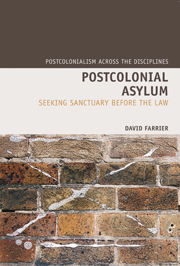4 - Allow Me My Destitution
Summary
The law nourishes itself on the exception and is a dead letter without it.
Giorgio AgambenParasitic reading and reading parasites
In a short film by Nick Broomfield and Marc Hoeferlin for Amnesty International, Ashfin, a destitute refused asylum seeker, describes his liminal existence:
[I]f you don't have acceptance paper from Home Office then you do not exist anymore as human being, your existence is gone. […] They put me to death without committing any crime. Nobody seemed to care and it was like my life is meaningless because my name is asylum seeker. It just didn't make sense to me that, in a country where they call themselves civilized, they put innocent man to death without any crime [sic].
Still Human Still Here, made for Amnesty's campaign on behalf of destitute asylum seekers, gives a compelling sense of the deprivations and injustice created by section 4 of the IAA 1999. But it also presents a problem of reception: just as Ashfin's case raises questions of how asylum seekers are welcomed in the UK, the matter of how to receive his testimony is, I think, almost as problematic. Bearing witness is an act of reception; therefore, does the listener, whether to oral or written accounts, play the role of host to the testimony, and, if so, how should that testimony be received? Such considerations begin to bring together an ethics of hospitality with an ethics of reading, which prompts the question, when faced with an account of refused hospitality, what might be the responsibility of the reader as host?
- Type
- Chapter
- Information
- Postcolonial AsylumSeeking Sanctuary Before the Law, pp. 124 - 152Publisher: Liverpool University PressPrint publication year: 2011

